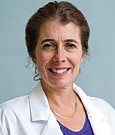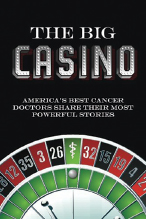The following essay by Karen J. Krag, MD, is adapted from The Big Casino: America’s Best Cancer Doctors Share Their Most Powerful Stories, which was coedited by Stan Winokur, MD, and Vincent Coppola and published in May 2014. The book is available on Amazon.com and thebigcasino.org.
It is easier to blame than to acknowledge that in most instances, we have little control over who develops cancer. It’s easy for patients to blame themselves as well as their current and past physicians. It’s also easy for us as physicians to blame our patients, prior physicians, our staff, and ourselves.
Patients come to us with awful diagnoses. Even those with a curable disease have to go through the angst of having cancer, making decisions about treatment, getting conflicting reports on the Internet and from friends, facing their own mortality, and worrying about whether they are getting the right care.
Those who have taken good care of their bodies can’t believe the diagnosis; those who have not also can’t believe it. But patients look back and try to find a reason for their cancer. Was it food they ate, additives they consumed, secondhand (or firsthand) smoke, pesticides from the dump in the next town, genetics, the street they grew up on, or cleaning supplies they used? Many things could be responsible, and some likely are. But it is easier to blame cancer on something than it is to acknowledge that we do not understand the whims of nature.
Patients also look back and question, “Why didn’t I know?” It’s easy to notice after a diagnosis that there was some abdominal pain, a cough, a lump, a vague headache, or a little fatigue. But these things are so common given the ups and downs of life that they get ignored. Once cancer is discovered, however, patients wonder whether more attention to such symptoms would have actually prevented the disease or resulted in a diagnosis of earlier-stage disease.
Patients also blame physicians. Would a more careful doctor have paid attention to the back pain? Would a better radiologist have noticed something on my scan? Could the surgeon have removed more tissue ensuring that the cancer would not recur?
Primary care physicians also go through the blame game at the time of a patient’s diagnosis. They blame themselves and other doctors: Why did I not pay more attention? How could the radiologist have missed the finding on the chest x-ray or mammogram? Why did I not pay greater attention to the patient’s anemia?
Those same physicians also blame the patient: Why did you ignore your weight loss? Why did you keep smoking? Why didn’t you call about your back pain? Why didn’t you do breast self-exams?
Pointing Fingers
When oncologists see a new patient, the same questions are often asked: How could your primary care doctor have missed this? What was the pathologist thinking? Why didn’t you seek a second opinion? As treatment progresses, oncologists blame themselves: Why did I choose that chemotherapy? Why did I choose that dose? Why did the patient with early-stage breast cancer relapse? What could I have done to prevent it? Why didn’t I tell my patient that he would likely die soon from cancer? Why didn’t I refer my patient to hospice earlier? Why couldn’t I convince my patient to stop smoking?
There is plenty of blame to go around. There is the medical staff to question: Why did you not tell me that the patient’s blood pressure was a little bit low? Why did you schedule this patient at this time? Why did you not tell me she hadn’t had a mammogram in 15 months? Why wasn’t she in the exam room faster?
There are the nurses to question: Why did you not recognize this rash as an allergic reaction? Why did you tell me she was OK? Why did you not send her for the test I asked for?
And there are the other physicians to question: Why did you not compare the x-rays? Why did you not deal with the patient’s blood sugar? Why did you not place the portacath correctly?
The Uncertainty of Life
Although blame is a tool for all of us to use to deal with the uncertainty of life, it is not a positive force. If you look at those patients who don’t look back and question why, they have much more peace. What gives them that sense of peace? Sometimes it’s faith and the serenity that comes from knowing that life has a greater meaning than the time spent on earth. Yet others who aren’t religious can have the same sense of peace. Why?
What I’ve been able to figure out from talking with my patients is that living in the moment is the best way to gain this sense of being—not to look back at what happened and try to find the why of it, but to enjoy every minute of each day, week, month, and year.
Living in the Present
This is the only life we have and to spend any energy looking at the past takes away from the enjoyment of life. While we have no control over the past or the future, and no control of others, we do have control of our own present. If we can learn this lesson from some of our patients and find a way to teach it to others, each of us—patient and physician alike—would live a more peaceful existence. ■
Dr. Krag is a medical oncologist, Department of Hematology/Oncology, Massachusetts General Hospital North Shore Cancer Center, Danvers, Massachusetts.



